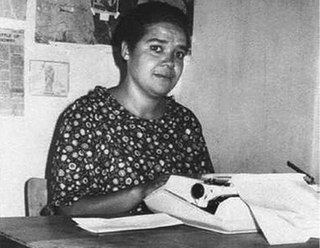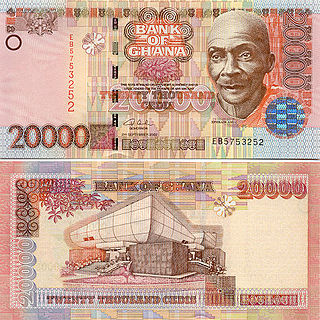Related Research Articles

Francis Kwame Nkrumah was a Ghanaian politician, political theorist, and revolutionary. He was the first Prime Minister and President of Ghana, having led the Gold Coast to independence from Britain in 1957. An influential advocate of Pan-Africanism, Nkrumah was a founding member of the Organization of African Unity and winner of the Lenin Peace Prize from the Soviet Union in 1962.

Chinua Achebe was a Nigerian novelist, poet, and critic who is regarded as a central figure of modern African literature. His first novel and magnum opus, Things Fall Apart (1958), occupies a pivotal place in African literature and remains the most widely studied, translated, and read African novel. Along with Things Fall Apart, his No Longer at Ease (1960) and Arrow of God (1964) complete the "African Trilogy". Later novels include A Man of the People (1966) and Anthills of the Savannah (1987). In the West, Achebe is often referred to as the "father of African literature", although he vigorously rejected the characterization.

Ama Ata Aidoo was a Ghanaian author, poet, playwright, politician, and academic. She was Secretary for Education in Ghana from 1982 to 1983 under Jerry Rawlings's PNDC administration. Her first play, The Dilemma of a Ghost, was published in 1965, making Aidoo the first published female African dramatist. As a novelist, she won the Commonwealth Writers' Prize in 1992 with the novel Changes. In 2000, she established the Mbaasem Foundation in Accra to promote and support the work of African women writers.
Dambudzo Marechera was a Zimbabwean novelist, short story writer, playwright and poet. His short career produced a book of stories, two novels, a book of plays, prose, and poetry, and a collection of poetry. His first book, a fiction collection entitled The House of Hunger (1978), won the Guardian Fiction Prize in 1979. Marechera was best known for his abrasive, heavily detailed and self-aware writing, which was considered a new frontier in African literature, and his unorthodox behaviour at the universities from which he was expelled despite excelling in his studies.

Bessie Amelia Emery Head was a South African writer who, though born in South Africa, is usually considered Botswana's most influential writer. She wrote novels, short fiction and autobiographical works that are infused with spiritual questioning and reflection.

Chief Daniel Olorunfẹmi Fágúnwà MBE, popularly known as D. O. Fágúnwà, was a Nigerian author of Yorùbá heritage who pioneered the Yorùbá language novel.

Ayi Kwei Armah is a Ghanaian writer best known for his novels including The Beautyful Ones Are Not Yet Born (1968), Two Thousand Seasons (1973) and The Healers (1978). He is also an essayist, as well as having written poetry, short stories, and books for children.

Ephraim Kɔku Amu was a Ghanaian composer, musicologist and teacher.
Elvania Namukwaya Zirimu was a Ugandan poet and dramatist. She formed the Ngoma Players, with the policy of writing and producing Ugandan plays, and was actively concerned with the National Theatre. She belonged to the early generation of English-language Ugandan writers and playwrights that includes novelist Okello Oculi, playwright John Ruganda, and novelist Austin Bukenya. Her best-known work is the one-act play Keeping up with the Mukasas, included in David Cook's 1965 anthology of East African plays, Origin East Africa.

Florence Nwanzuruahu Nkiru Nwapa, was a Nigerian author who has been called the mother of modern African Literature. She was the forerunner to a generation of African women writers, and the first African woman novelist to be published in the English language in Britain. She achieved international recognition with her first novel Efuru, published in 1966 by Heinemann Educational Books. While never considering herself a feminist, she was best known for recreating life and traditions from an Igbo woman's viewpoint.
John Munonye was an Igbo writer and one of the most renowned Nigerian writers of the 20th century.
Frank Smith (1928-2020) was a Canadian psycholinguist recognized for his contributions in linguistics and cognitive psychology. He was an essential contributor to research on the nature of the reading process together with researchers such as George Armitage Miller, Kenneth S. Goodman, Paul A. Kolers, Jane W. Torrey, Jane Mackworth, Richard Venezky, Robert Calfee, and Julian Hochberg. Smith and Goodman are founders of whole language approach for reading instruction. He was the author of numerous books.
Samuel Asare Konadu was a Ghanaian journalist, novelist, and publisher who also wrote under the pseudonym Kwabena Asare Bediako.
Yulisa Amadu Pat Maddy was a Sierra Leonean writer, poet, actor, dancer, director and playwright. Known by his friends and colleagues as Pat Maddy or simply Prof, he had an "immense impact" on theatre in Sierra Leone, Nigeria and Zambia.
Paul Geoffrey Edwards was a wide-ranging literary scholar at the University of Edinburgh, appreciated for his "adventurous and unorthodox teaching".
Francis Selormey was a Ghanaian novelist, teacher, scriptwriter and sports administrator.
Geormbeeyi Adali-Mortty is a Ghanaian poet and writer.
B. Kojo Laing or Bernard Kojo Laing was a Ghanaian novelist and poet, whose writing is characterised by its hybridity, whereby he uses Ghanaian Pidgin English and vernacular languages alongside standard English. His first two novels in particular – Search Sweet Country (1986) and Woman of the Aeroplanes (1988) – were praised for their linguistic originality, both books including glossaries that feature the author's neologisms as well as Ghanaian words.

Aligarh Muslim University is a public central university in Aligarh, Uttar Pradesh, India, which was originally established by Sir Syed Ahmad Khan as the Muhammadan Anglo-Oriental College in 1875. Muhammadan Anglo-Oriental College became Aligarh Muslim University in 1920, following the Aligarh Muslim University Act. It has three off-campus centres in AMU Malappuram Campus (Kerala), AMU Murshidabad Centre, and Kishanganj Centre (Bihar).
Theophilus Quancoo Armar was a Ghanaian educationist, publisher and textbook writer.
References
- 1 2 Sharon Malinowski, ed. (1994). Black Writers: A Selection of Sketches from Contemporary Authors. Cengage Gale. p. 194. ISBN 978-0-8103-7788-2 . Retrieved 18 November 2012.
- 1 2 G. D. Killam, Alicia L. Kerfoot, ed. (2008). Student Encyclopedia of African Literature. ABC-CLIO. pp. 109–110. ISBN 978-0-313-33580-8 . Retrieved 18 November 2012.
- ↑ S. A. Amu Djoleto (1968). The Strange Man. Heinemann. p. 286. ISBN 978-0-435-90041-0 . Retrieved 18 November 2012.